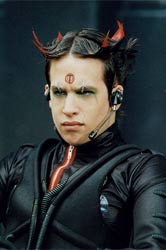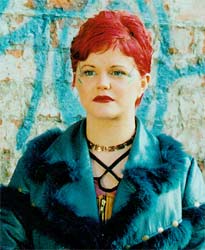 In Tribe IV, the Technos come to power through force. Ram becomes ruler through non- democratic means (no election was held).
In Tribe IV, the Technos come to power through force. Ram becomes ruler through non- democratic means (no election was held).
According to Aristotle, the ancient Greek Philosopher, there are four possible types of government:
The two forms of government that we are most concerned with in this article are the first two on the list. Most of us live in a democracy. Let’s compare it with the tyranny in Tribe IV and consider the differences.
What makes Ram a tyrant?
Ram is self-serving as opposed to state serving. The fundamental objective behind ‘The Game’ is to make sure that he is preserved in a state of Virtual Paradise. He is prepared to use and abuse the majority of the city’s population in order to achieve his selfish aims.
Tyrants often get it into their heads that they have the right to make decisions that drastically affect other people’s lives. The tyrant may believe that if his or her selfish interests are served, then the interests of the state will follow. This is very rarely the case.
Ram treats the populace with disdain. He regards Virts as only ‘half alive’, which is ironic considering the Virtual Reality state that he sees as his final objective. They are but pawns in his game. The treatment of certain groups as second class citizens is consistent with the ethics of tyrants throughout history (even though these types of attitudes have pervaded other types of governments as well).

Ram is the one who makes decisions. There is no democracy in the form of a parliament or council. Although there is a City Leader who is supposed to speak for the Virts, Ram keeps a tight control on this. At one stage, Salene complains that she feels like a puppet as City Leader. This is because Ram pulls all of the strings – he controls everything. The fact that there is a City Leader at all puts up a front that suggests democracy when, in fact, it is a thinly disguised veil for Ram’s tyrannical government. It is a credit to Salene that she manages to achieve as much as she does – insisting on the building of hospitals. The only way to achieve this is to go begging to Ram as he is the one holding the cards.
 There is no election for leader of the Technos. Ram is it and pity help anybody that tries to change the status quo. There is an election held for city leader among the virts but this is also rigged with Ram having the final say over the result. He chooses as City Leader, Salene, whom he expects to cause the least amount of resistance and will be easy to manipulate.
There is no election for leader of the Technos. Ram is it and pity help anybody that tries to change the status quo. There is an election held for city leader among the virts but this is also rigged with Ram having the final say over the result. He chooses as City Leader, Salene, whom he expects to cause the least amount of resistance and will be easy to manipulate.
He is proven wrong by Salene. A characteristic, which is typical of tyrannical or totalitarian regimes in the 20th century is Ram’s use of propaganda and manipulation of the media. He denies the virts true freedom of speech. He censors their city net site and denies them the right to protest on occasions. The technos remove any anti-Techno material such as posters. This is consistent with historical examples of tyrants, who burned books that expressed views different from their own because they were seen as ‘dangerous.’ City Net in itself is simply a vehicle to promote Ram and to sell the idea of the ‘Game.’
Ram controls amenities such as water and electricity. He uses these to manipulate the virts and is prepared to withdraw and then provide these to the populace in order to win their support.

Like most tyrants, Ram could be called a ‘control freak.’ He is not altogether happy leaving decisions to other people. His desire for power control may stem from insecurity that he lacks control in other aspects of his life because of his disability.
Anybody that disagrees with his decisions is ostracised or made an example of. Often Ram is known to ‘zap’ guards who make a mistake – therefore ruling by terror and force. Dissenters are very aware of the consequences that will face them.
Ram has favourites such as Java and Ved but these are likely to change at a whim. He plays characters such as Ved and Jay; Java and Ebony off each other in order to secure an advantage.
Democracy over tyranny
Most of us are lucky enough to live in a democracy. We have rights and can have a say into the way our country runs. This differs drastically from the situation in the Tribe IV.
Some of the advantages of living in a democracy include:
There are many other types of government which have occurred in the last 100 years. These have included:
While the first two have both fallen from favour, the last one has seemed to have endured.
Some may argue the disadvantages of Democratic Capitalism on the basis of greed and inequality. These opinions are very common at the moment in the light of debates over globalisation and Earth summits.
Some questions that may be worth pondering:
What form of government will best protect your rights?
Overall, what are the advantages and disadvantages of each form of government?
What can we do to prevent a tyranny from occurring within our country?

